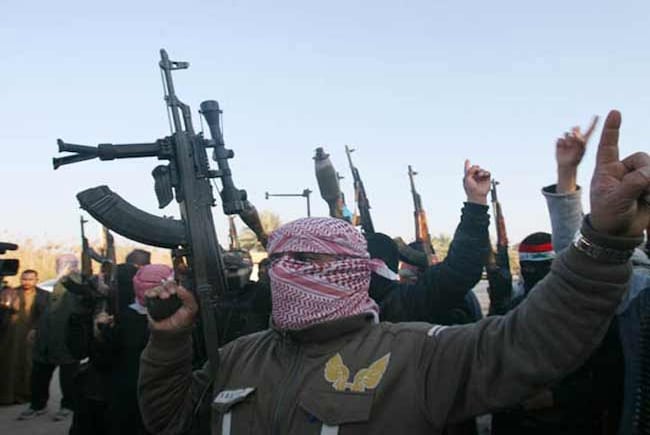
File Photo: Members of the Islamic State militant group. (Associated Press)
BAGHDAD:
Iraq's most powerful Shi'ite cleric called for a global war against Islamic State today, a day after the prime minister said he would welcome Russian air strikes against the group on Iraqi soil.
Grand Ayatollah Ali al-Sistani, who has a huge following and can often influence government thinking, was speaking through an aide after nationally televised today prayers.
"Battle with Daesh is destined for all Iraqis," said Sistani, using an Arabic acronym for Islamic State.
"But it's not their battle alone but the whole world, because terrorists target with their dark ideology all humanity, its culture and morals."
He added: "It's essential to join together all efforts and expand the parameters of countering this movement"
The United States has led air strikes against Islamic State in Iraq, as well as in Syria, for more than a year, but Baghdad has repeatedly called for engagement and air support for Iraqi forces trying to regain territory against the ultra-hardline Sunni group.
Russia began bombing raids in Syria on Wednesday against groups fighting the forces of President Bashar al-Assad, which include Islamic State.
Iraqi Prime Minister Haider al-Abadi said on Thursday his government would welcome Russian air strikes against IS in Iraq, and was receiving information from both Syria and Russia on the group.
Abadi, asked by France 24 television whether he had discussed air strikes with Russia in his country, said: ""Not yet". He added:
"It is a possibility. If we get the offer we will consider it and I would welcome it."
Russian Foreign Minister Sergei Lavrov said on Thursday that Moscow was not planning to expand its air strikes to Iraq.
Iraq's military joint operations command said on September 27 its officials were cooperating on intelligence and security in Baghdad with Russia, Iran and Syria to counter the threat from Islamic State.
Iraqi officials have suggested this cooperation would focus on countering the threat from Islamic State in Syria.
Iraqi officials said the agreement to share intelligence with Russia did not mean the United States would lose influence with the Baghdad government.
But diplomats and officials said Abadi may use the growing Russian presence as leverage to secure greater American cooperation, including weapons from Washington.
Grand Ayatollah Ali al-Sistani, who has a huge following and can often influence government thinking, was speaking through an aide after nationally televised today prayers.
"Battle with Daesh is destined for all Iraqis," said Sistani, using an Arabic acronym for Islamic State.
"But it's not their battle alone but the whole world, because terrorists target with their dark ideology all humanity, its culture and morals."
He added: "It's essential to join together all efforts and expand the parameters of countering this movement"
The United States has led air strikes against Islamic State in Iraq, as well as in Syria, for more than a year, but Baghdad has repeatedly called for engagement and air support for Iraqi forces trying to regain territory against the ultra-hardline Sunni group.
Russia began bombing raids in Syria on Wednesday against groups fighting the forces of President Bashar al-Assad, which include Islamic State.
Iraqi Prime Minister Haider al-Abadi said on Thursday his government would welcome Russian air strikes against IS in Iraq, and was receiving information from both Syria and Russia on the group.
Abadi, asked by France 24 television whether he had discussed air strikes with Russia in his country, said: ""Not yet". He added:
"It is a possibility. If we get the offer we will consider it and I would welcome it."
Russian Foreign Minister Sergei Lavrov said on Thursday that Moscow was not planning to expand its air strikes to Iraq.
Iraq's military joint operations command said on September 27 its officials were cooperating on intelligence and security in Baghdad with Russia, Iran and Syria to counter the threat from Islamic State.
Iraqi officials have suggested this cooperation would focus on countering the threat from Islamic State in Syria.
Iraqi officials said the agreement to share intelligence with Russia did not mean the United States would lose influence with the Baghdad government.
But diplomats and officials said Abadi may use the growing Russian presence as leverage to secure greater American cooperation, including weapons from Washington.
© Thomson Reuters 2015
Track Latest News Live on NDTV.com and get news updates from India and around the world

